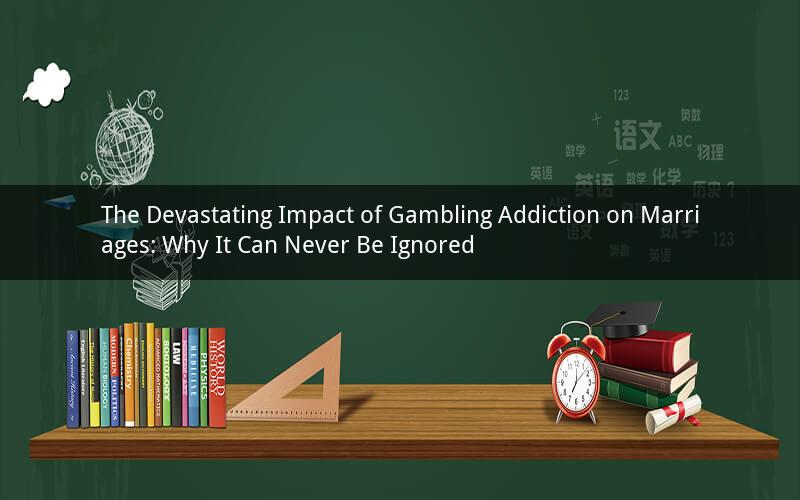
Introduction:
Gambling addiction, often hidden beneath the glitz and glamour of the gaming world, has the power to rip apart the fabric of a marriage. Understanding why a gambling addiction ruins marriages is crucial for those who may be struggling with this issue or know someone who is. In this article, we will delve into the reasons behind the destructive nature of gambling addiction and its impact on marital relationships.
1. Emotional Disconnect
One of the primary reasons why a gambling addiction ruins marriages is the emotional disconnect it creates between partners. As an individual becomes consumed by their gambling habits, they often prioritize their addiction over their marriage. This can lead to a lack of emotional support, communication breakdowns, and feelings of betrayal and neglect within the marriage.
2. Financial Ruin
Gambling addiction is an insidious financial burden that can lead to the ruination of a marriage. The constant need to feed the addiction often results in extravagant spending, hidden debts, and financial instability. This financial strain can lead to arguments, stress, and even the loss of the family home, further deepening the wedge between partners.
3. Trust Issues
Trust is the foundation of any successful marriage. However, a gambling addiction can shatter that trust. The secrecy, lying, and deceit that come with gambling addiction erode the bond of trust between partners. The constant fear of discovery and the resulting consequences can create an atmosphere of fear and anxiety, making it difficult for couples to rebuild their trust in one another.
4. Neglect of Responsibilities
A gambling addiction often leads to the neglect of everyday responsibilities, both within the marriage and in the broader family unit. This neglect can manifest in various ways, such as ignoring children's needs, failing to meet financial obligations, or neglecting household chores. As the addiction takes precedence over these responsibilities, it can lead to feelings of resentment and frustration within the marriage.
5. Communication Breakdown
Communication is key to maintaining a healthy marriage. However, a gambling addiction can create a significant barrier to open and honest communication. As one partner becomes consumed by their addiction, they may withdraw emotionally, making it difficult for the other partner to express their concerns, fears, and needs. This breakdown in communication can lead to isolation and further exacerbate the problems within the marriage.
6. Impact on Children
The destructive nature of gambling addiction does not only affect the couple but also has a profound impact on any children involved. Witnessing the turmoil and stress caused by a parent's addiction can lead to emotional and psychological damage. Children may feel neglected, angry, or afraid, leading to behavioral issues and a strained relationship with both parents.
7. The Cycle of Denial and Enablement
Gambling addiction often comes with a cycle of denial and enablement within the marriage. The non-gambling partner may try to enable the addiction, either out of love or a desire to protect the family. This can lead to a perpetuation of the addiction, as the non-gambling partner may continue to bail the gambler out of financial trouble or make excuses for their behavior. This cycle of denial and enablement can further erode the marriage and leave both partners feeling trapped and helpless.
8. The Struggle for Recovery
Recovery from a gambling addiction is a challenging and often lengthy process. It requires the commitment and support of both partners. However, the non-gambling partner may struggle with feelings of guilt, resentment, and betrayal, making it difficult to fully support their partner's recovery. This struggle can lead to further strain on the marriage and hinder the progress of recovery.
Conclusion:
The devastating impact of gambling addiction on marriages cannot be overstated. Understanding the reasons behind this destruction is crucial for those who may be affected. By addressing the emotional, financial, and psychological aspects of gambling addiction, couples can work towards healing their relationship and rebuilding a stronger, healthier bond.
Questions and Answers:
1. Q: How can a gambling addiction lead to financial ruin?
A: A gambling addiction can lead to financial ruin through extravagant spending, hidden debts, and neglect of financial responsibilities. The insatiable need to feed the addiction often results in the depletion of savings, credit card debt, and even the sale of assets, leading to financial instability and arguments within the marriage.
2. Q: Can a gambling addiction be considered an emotional affair?
A: Yes, a gambling addiction can be considered an emotional affair. The time and emotional energy spent on gambling can lead to neglect of the marriage, emotional withdrawal, and a focus on the thrill and excitement of the addiction, rather than on the partner and the relationship.
3. Q: How can couples work together to overcome a gambling addiction?
A: Couples can work together to overcome a gambling addiction by seeking professional help, attending support groups, and establishing boundaries and consequences for gambling behavior. Open and honest communication, trust-building exercises, and a strong support system are essential components of this process.
4. Q: What are some signs of a gambling addiction in a marriage?
A: Signs of a gambling addiction in a marriage include secretiveness, financial strain, neglect of responsibilities, emotional withdrawal, arguments, and the inability to control gambling behavior. Recognizing these signs can be crucial in seeking help and addressing the addiction early on.
5. Q: How can a non-gambling partner support their addicted spouse during recovery?
A: A non-gambling partner can support their addicted spouse during recovery by seeking their own support, such as attending support groups or counseling. They can also offer empathy, encouragement, and understanding, while setting clear boundaries and consequences for gambling behavior. Building a strong support system and focusing on their own well-being is also essential for the couple's recovery journey.